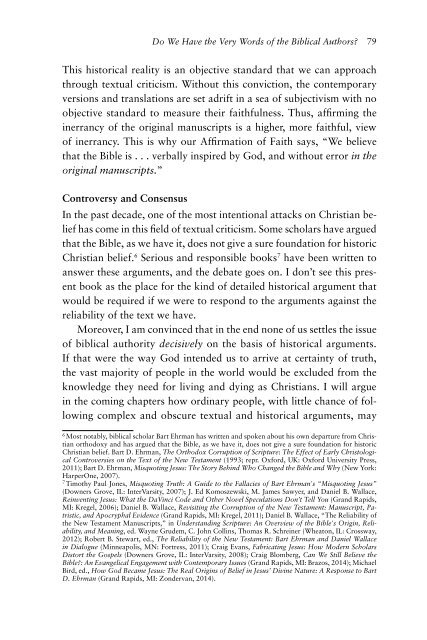Scriptures selfattesting authority question doctrine truthfulness Scriptures
peculiar-glory-en
peculiar-glory-en
Create successful ePaper yourself
Turn your PDF publications into a flip-book with our unique Google optimized e-Paper software.
Do We Have the Very Words of the Biblical Authors? 79<br />
This historical reality is an objective standard that we can approach<br />
through textual criticism. Without this conviction, the contemporary<br />
versions and translations are set adrift in a sea of subjectivism with no<br />
objective standard to measure their faithfulness. Thus, affirming the<br />
inerrancy of the original manuscripts is a higher, more faithful, view<br />
of inerrancy. This is why our Affirmation of Faith says, “We believe<br />
that the Bible is . . . verbally inspired by God, and without error in the<br />
original manuscripts.”<br />
Controversy and Consensus<br />
In the past decade, one of the most intentional attacks on Christian belief<br />
has come in this field of textual criticism. Some scholars have argued<br />
that the Bible, as we have it, does not give a sure foundation for historic<br />
Christian belief. 6 Serious and responsible books 7 have been written to<br />
answer these arguments, and the debate goes on. I don’t see this present<br />
book as the place for the kind of detailed historical argument that<br />
would be required if we were to respond to the arguments against the<br />
reliability of the text we have.<br />
Moreover, I am convinced that in the end none of us settles the issue<br />
of biblical <strong>authority</strong> decisively on the basis of historical arguments.<br />
If that were the way God intended us to arrive at certainty of truth,<br />
the vast majority of people in the world would be excluded from the<br />
knowledge they need for living and dying as Christians. I will argue<br />
in the coming chapters how ordinary people, with little chance of following<br />
complex and obscure textual and historical arguments, may<br />
6<br />
Most notably, biblical scholar Bart Ehrman has written and spoken about his own departure from Christian<br />
orthodoxy and has argued that the Bible, as we have it, does not give a sure foundation for historic<br />
Christian belief. Bart D. Ehrman, The Orthodox Corruption of Scripture: The Effect of Early Christological<br />
Controversies on the Text of the New Testament (1993; repr. Oxford, UK: Oxford University Press,<br />
2011); Bart D. Ehrman, Misquoting Jesus: The Story Behind Who Changed the Bible and Why (New York:<br />
HarperOne, 2007).<br />
7<br />
Timothy Paul Jones, Misquoting Truth: A Guide to the Fallacies of Bart Ehrman's “Misquoting Jesus”<br />
(Downers Grove, IL: Inter Varsity, 2007); J. Ed Komoszewski, M. James Sawyer, and Daniel B. Wallace,<br />
Reinventing Jesus: What the DaVinci Code and Other Novel Speculations Don’t Tell You (Grand Rapids,<br />
MI: Kregel, 2006); Daniel B. Wallace, Revisiting the Corruption of the New Testament: Manuscript, Patristic,<br />
and Apocryphal Evidence (Grand Rapids, MI: Kregel, 2011); Daniel B. Wallace, “The Reliability of<br />
the New Testament Manuscripts,” in Understanding Scripture: An Overview of the Bible's Origin, Reliability,<br />
and Meaning, ed. Wayne Grudem, C. John Collins, Thomas R. Schreiner (Wheaton, IL: Crossway,<br />
2012); Robert B. Stewart, ed., The Reliability of the New Testament: Bart Ehrman and Daniel Wallace<br />
in Dialogue (Minneapolis, MN: Fortress, 2011); Craig Evans, Fabricating Jesus: How Modern Scholars<br />
Distort the Gospels (Downers Grove, IL: Inter Varsity, 2008); Craig Blomberg, Can We Still Believe the<br />
Bible?: An Evangelical Engagement with Contemporary Issues (Grand Rapids, MI: Brazos, 2014); Michael<br />
Bird, ed., How God Became Jesus: The Real Origins of Belief in Jesus’ Divine Nature: A Response to Bart<br />
D. Ehrman (Grand Rapids, MI: Zondervan, 2014).


